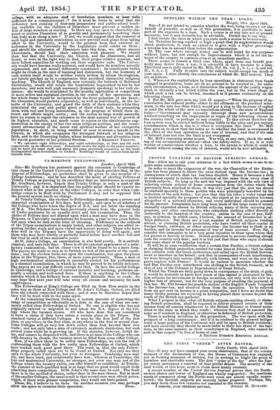SUPPLIES WITHIN THE YEAR: LOANS.
Temple, 10th April 1854. Sue—I do not intend to consider whether the wart being incurred for the benefit of posterity as well as of this generation, it is justifiable to meet part of the expenses by a loan. Such a course is at any rate not at present necessary, but it may nevertheless be advisable. Permit me to say why.
I first restate the cases in which you state such a source to be necessary. 1st. Taxation having reached so high a point that its augmentation would cheek production, to such an extent as to give with a higher percentage a revenue less in amount than before the augmentation. 2d. The case where enough money can be still found for war purposes without loans, but not enough for improvements which it is for the in- terest of the country to continue even at an immediate sacrifice.
There seems to remain a third case where, apart from any benefit pos- terity may derive from a war, it is advisable to have recourse to a loan. This third case is fully stated by Mr. Mill, Pol. Fe. vol. I., b. i., c. 5, and vol. II., b. 5, c. 2. Fully to enter into the subject would occupy too much of your space. I state shortly the conclusions at which Mr. Mill arrived. they are as follows.
1. Wherever the capital taken by loan operations is abstracted from funds engaged in production, loans are on no account to be resorted to ; for under such circumstances, a loan, as it diminishes the amount of the yearly wages- fund, is virtually a tax levied within the year, but in the worst shape in which such a tax can be levied, inasmuch as it presses exclusively on the labouring classes.
2. But Mr. Mill goes on to say (vol. II. supra)—" When the progress of ac- cumulation has reduced profits either to the ultimate or the practical mini- mum, to the rate less than which would put a stop to the increase of capital or send the whole of the new accumulations abroad "—the state of England today—" Government may annually intercept those new accumulations without trenching on the employment or wages of the labouring classes in the country itself, or perhaps in any country. To this extent therefore the loan system may be carried without being liable to the ultra and peremptory condemnation which is due to it when it overpasses this limit.' Mr. Mill then goes on to show that the index as to whether the limit is overpaaaed is the effect of the loan operation on the rate of interest, and that if the rate of interest does not rise the limit is not overpassed. Mr. Mill's reasoning seems sound. War will, at any rate, check the send- ing of our accumulations abroad—shut one safety-valve. If so, it is well worthy of consideration whether a loan, to the extent to which it could be effected without raising the rate of interest, would not be now advisable.
44.


























 Previous page
Previous page